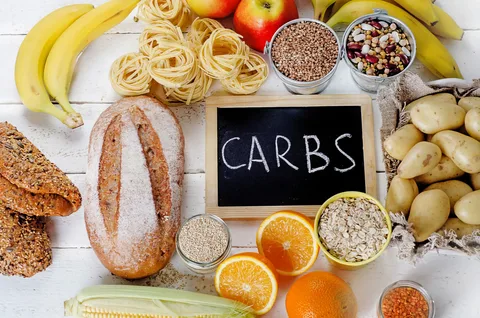Understanding Refined Carbohydrates
Refined carbohydrates are processed carbohydrates that have been stripped of their natural fiber, vitamins, and minerals during manufacturing. These carbohydrates are typically found in processed foods made from refined grains, such as white flour, white rice, and added sugars like high fructose corn syrup. Unlike whole grains, which retain their fiber-rich bran and nutrient-packed germ, refined carbs offer little nutritional value and are quickly digested and absorbed by the body, leading to rapid spikes in blood sugar levels.
Why Refined Carbs Are Bad For You
Spike in Blood Sugar
Refined carbs are quickly broken down into glucose, leading to a rapid increase in blood sugar levels. This spike in blood sugar triggers the release of insulin, a hormone produced by the pancreas to help cells absorb glucose for energy. Over time, frequent spikes in blood sugar can contribute to insulin resistance, a condition in which cells become less responsive to insulin’s effects, potentially leading to type 2 diabetes.
Weight Gain and Obesity
Refined carbs are often calorie-dense but lacking in satiety-promoting fiber and nutrients, making it easy to overconsume them without feeling full or satisfied. Excessive consumption of refined carbs can lead to weight gain and obesity, as the body stores excess calories as fat. High intake of refined carbs has been linked to abdominal obesity, a type of fat accumulation associated with an increased risk of metabolic syndrome, heart disease, and other health problems.
Increased Risk of Chronic Diseases
A diet high in refined carbs has been associated with an increased risk of chronic diseases, including type 2 diabetes, heart disease, and certain types of cancer. Refined carbs promote inflammation in the body, which plays a key role in the development of chronic diseases. Additionally, refined carbs can raise triglyceride levels, lower HDL (good) cholesterol levels, and increase the risk of heart disease and stroke.
Poor Digestive Health
Refined carbs lack the fiber found in whole grains, which is essential for digestive health and regular bowel movements. A diet low in fiber can lead to constipation, diverticulitis, and other digestive issues. Additionally, refined carbs can disrupt the balance of bacteria in the gut microbiome, leading to dysbiosis and increased risk of gastrointestinal disorders.
Negative Impact on Mood and Energy Levels
Consuming large amounts of refined carbs can lead to fluctuations in blood sugar levels, resulting in mood swings, fatigue, and decreased energy levels. Refined carbs provide a quick energy boost followed by a crash, leaving you feeling tired and lethargic. This cycle of energy highs and lows can negatively impact mood, concentration, and overall well-being.
Dental Health Issues
Refined carbs, especially those containing added sugars, can contribute to dental health issues like tooth decay and cavities. Bacteria in the mouth feed on sugars from refined carbs, producing acids that erode tooth enamel and promote dental decay. Limiting consumption of sugary and refined foods can help maintain optimal dental health and prevent oral health problems.
Healthier Alternatives to Refined Carbs
Whole Grains
Choose whole grains over refined grains whenever possible. Whole grains like oats, brown rice, quinoa, and whole wheat contain fiber, vitamins, minerals, and antioxidants that provide numerous health benefits, including improved digestion, reduced risk of chronic diseases, and better weight management.
Fruits and Vegetables
Incorporate plenty of fruits and vegetables into your diet to increase fiber intake and satisfy your sweet cravings with natural sugars. Fruits and vegetables are nutrient-dense and provide essential vitamins, minerals, and antioxidants that support overall health and well-being.
Legumes
Legumes such as beans, lentils, and chickpeas are excellent sources of protein, fiber, and complex carbohydrates. Including legumes in your diet can help stabilize blood sugar levels, promote satiety, and support digestive health.
Nuts and Seeds
Nuts and seeds are nutrient-rich snacks that provide healthy fats, protein, fiber, vitamins, and minerals. Incorporating nuts and seeds into your diet can help curb cravings for refined carbs while providing sustained energy and promoting heart health.
Dairy Products
Choose dairy products like plain yogurt, cheese, and milk over sugary alternatives like flavored yogurt and sweetened milk beverages. Dairy products provide protein, calcium, and other essential nutrients without the added sugars found in many flavored and sweetened options.
Sweeteners in Moderation
Limit your intake of added sugars and sweeteners, including table sugar, high fructose corn syrup, and artificial sweeteners. Opt for natural sweeteners like honey, maple syrup, or stevia in moderation, and be mindful of hidden sugars in processed foods and beverages.
FAQs About Refined Carbs
What are some common sources of refined carbohydrates?
Common sources of refined carbohydrates include white bread, white rice, pasta made from white flour, pastries, cakes, cookies, candy, sugary beverages, and processed snack foods like chips and crackers.
How can I reduce my intake of refined carbohydrates?
To reduce your intake of refined carbohydrates, focus on choosing whole, minimally processed foods like whole grains, fruits, vegetables, legumes, nuts, seeds, and lean proteins. Read food labels carefully to identify hidden sources of refined carbs and sugars in packaged foods.
Are all carbohydrates bad for you?
No, not all carbohydrates are bad for you. Carbohydrates are a vital source of energy for the body and play a crucial role in overall health and well-being. However, the quality and type of carbohydrates you consume matter. Focus on choosing complex carbohydrates from whole, unprocessed sources and limiting your intake of refined carbohydrates and added sugars.
Can I still enjoy refined carbs occasionally?
While it’s best to limit your intake of refined carbohydrates for optimal health, enjoying them occasionally in moderation is unlikely to cause significant harm. The key is to balance your diet with nutrient-rich foods and be mindful of portion sizes when consuming refined carbs.
How can I satisfy my cravings for sweets without consuming refined carbohydrates?
You can satisfy your cravings for sweets by choosing healthier alternatives like fruits, yogurt with honey, dark chocolate, or homemade desserts made with whole grains, natural sweeteners, and nutritious ingredients. Experiment with recipes to create delicious and satisfying treats that nourish your body and mind.
Are all sugars considered refined carbohydrates?
No, not all sugars are considered refined carbohydrates. While refined sugars like white sugar and high fructose corn syrup are classified as refined carbohydrates, natural sugars found in fruits, vegetables, and dairy products are not considered refined carbohydrates. These natural sugars come packaged with fiber, vitamins, minerals, and other beneficial nutrients that contribute to overall health.
Can I lose weight by cutting out refined carbohydrates?
Cutting out refined carbohydrates alone is unlikely to guarantee weight loss, but it can be a part of a comprehensive weight loss strategy. To lose weight effectively and sustainably, focus on creating a calorie deficit through a combination of healthy eating, regular physical activity, and lifestyle modifications. Incorporate whole, nutrient-rich foods into your diet, and be mindful of portion sizes to support weight loss goals.
Conclusion
Refined carbohydrates have earned a reputation for being detrimental to health due to their low nutritional value, high calorie density, and potential negative impact on blood sugar levels, weight management, and overall well-being. By understanding the reasons why refined carbs are bad for you and making informed choices about your dietary habits, you can take steps to minimize their consumption and prioritize whole, nutrient-rich foods that nourish your body and promote optimal health. Remember to focus on balance, moderation, and sustainability when making dietary changes, and consult with a healthcare professional or registered dietitian for personalized guidance and support on your journey toward better health.
- Traptox Aka Trapezius Botox Treatment Near Laleham, Surrey - January 2, 2025
- Traptox Aka Trapezius Botox Treatment Near Sunbury On Thames, Surrey - January 2, 2025
- Infantilism Fetish: Role-Playing Regression And Comfort - January 2, 2025



